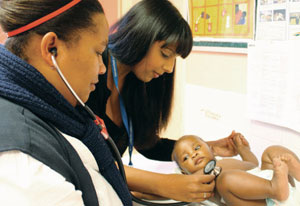Profile: Fogarty Fellow Dr Bhakti Hansoti develops triage tool for South African children
July / August 2014 | Volume 13, Issue 4

Photo courtesy of Dr. Bhakti Hansoti
Fogarty Fellow Dr. Bhakti Hansoti implemented
a screening method for use in primary care facilities
to help improve emergency medical care for children
in low-resource settings in South Africa.
By Cathy Kristiansen
Fogarty Fellow Dr. Bhakti Hansoti looks at the long, orderly line of parents and their children in the Cape Town clinic and sees something wrong with the picture. Randomly mixed in with children coming for well-visits are the very sick, who will wait for hours until it's their turn for attention.
In South Africa, most primary care clinics - where over half of critically ill children are first tended - have no formal triage system to identify those patients who need to be sent immediately to a hospital for specialized care. One reason is that many youngsters are on their mother's back and a formal assessment would require each child to be unwrapped and undressed upon arrival.
Hansoti, an emergency medicine physician trained at Edinburgh University in the U.K., and now based at Johns Hopkins Hospital, received a Fogarty fellowship to study emergency care in South Africa. Fogarty's
Global Health Program for Fellows and Scholars provides one-year, mentored clinical research experiences overseas for postdoctoral Fellows and pre-doctoral Scholars, helping to foster the next generation of clinical investigators and to build global health partnerships between U.S. and other researchers and institutions.
The WHO suggests that improving urgent care in developing countries would substantially lift the burden of death and disability. "Emergency care is a big public health issue, but funding is difficult because it covers many specialties," Hansoti says. "It's everything from disaster response to obstetric crises to urgent care for chronic illnesses."
Hansoti nurtured a deep interest in global health as she worked in clinics in Liberia, China, India, Ghana, Uganda, Jamaica and Nepal. In time, she chose her specialty. "I found I liked undifferentiated patients. I like the buzz and energy that comes with emergency medicine, not knowing what my day would be like."
With the help of her mentor, Dr. Lee A. Wallis, at the University of Cape Town, Hansoti developed a research project based on a previous study at a city hospital that found more than a third of critically unwell children had adverse outcomes due to delayed triage and referral from primary to specialist care.
Bhakti adapted the WHO's Integrated Management of Childhood Illnesses tool to create a screening method designed for use in primary care facilities in low-resource settings.
The Sick Children Require Emergency Evaluation Now (SCREEN) approach is so straightforward that lay health care workers can be trained to use it in one hour. The tool comprises seven questions posed in the parent's language designed to detect danger signs. The questioner asks, for example, if the child is sick, under two months old, able to lift his head, eat and drink, or has vomited. Hansoti recalls that one mother, quizzed just as the clinic was opening, said her child couldn't eat and was "floppy." Within 10 minutes, the child had been examined by a nurse and started on IV antibiotics and fluids, and then 30 minutes later was in an ambulance going to a hospital.
Hansoti has tested the screening strategy in 10 primary care clinics, measuring its reliability and impact on waiting times for sick and well children. To handle the data and measure the flow of patients, she produced a cellphone application. Currently, about 1 in 10 children on average are flagged for priority care each day. Hansoti is now studying the impact on clinical outcomes. In the meantime, Cape Town's health authorities have decided to fund training and staff so that all primary health care clinics can use SCREEN to evaluate children on arrival.
As she completes her first fellowship year, Hansoti counts among her new skills the ability to design a project, start it, and conduct qualitative work and needs assessments. She says having dedicated time to focus on a single research project is invaluable. "Your thought flow, your work flow doesn't get interrupted and you can really see a project through from start to completion and deal with problems in real time," she says. "A fellowship allows you to pursue your passion. It's been the best time of my life!"
More Information
To view Adobe PDF files,
download current, free accessible plug-ins from Adobe's website.